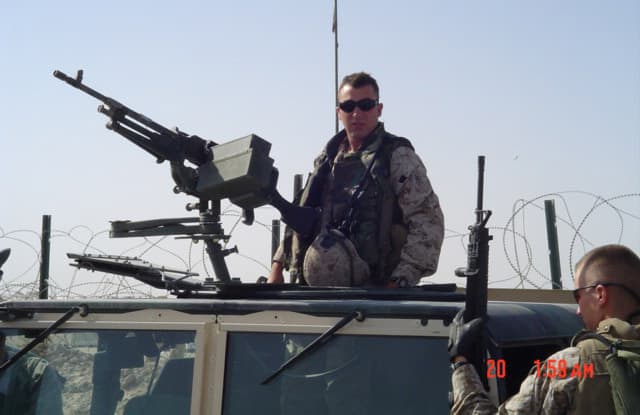Advertisement
Boston Marine Remembers Battle Of Fallujah 10 Years Later
ResumeTen years ago today, U.S. Marines began their assault of the Iraqi city of Fallujah.
Operation Phantom Fury, as it was called, would become the bloodiest battle for American forces in the Iraq War. Fighting lasted for weeks, with troops going from house to house to clear out what had become an insurgent stronghold.
The story begins in March 2004, when four American contractors were ambushed and killed in Fallujah. Their bodies were burned, dragged through the street and hung from a bridge spanning the Euphrates River.
That set off a massive operation in the city to root out extremists, but one that was largely ineffective, leading U.S. forces to pull out of the city in May.
"The insurgents basically had Fallujah and were doing whatever they want," said Chris Lessard, who was 26 when he deployed to Iraq in September 2004. "We still wanted payback, because we felt like it hadn't been completed until we had Fallujah."
Days after then-President George W. Bush won re-election, Lessard and his unit were on their way to Fallujah.
The night of Nov. 7, he was part of the group that captured Fallujah General Hospital as part of a diversionary tactic — something to distract insurgents from the main fighting force moving in from the north.
All that night, humvees parked along the river blasted heavy metal music into the city, and as soon as it was light out, Lessard's unit came under fire from fighters across the river.
"That was something else. That was my first exposure to combat and came out fine," he said, noting his unit only suffered one minor injury. "It was scary how addicting combat was. It was such an adrenaline [rush], that I don't think there's anything man-made that can replicate that kind of feeling."
While that was happening in the western part of the city, the main force of U.S. troops were working their way down from the north.
Their assignment? Clear every building of insurgents. Units would keep a log of where they encountered the enemy, and how many they had killed.
That log was used for Lessard's next assignment — removing the dead.
"It got pretty gruesome. By the time we were getting to some of these bodies, dogs were eating them, bones were sticking out," Lessard recalled. "And it happens very quickly. You go a day, two, three days, and all of the sudden that body doesn't look right."
Through all of this, Lessard's unit was also clearing buildings. Even though troops had already passed through the area, there was always the chance an insurgent could have moved back into a house, waiting for the next patrol.
"I don't know how to explain it. It was like fighting a war in Brighton — you didn't know what block was hot and what block wasn't," he said. "So it was a little hairy at times. It was actually fun, but scary. You didn't know what you were coming into."

Lessard stayed in Fallujah for about 10 days before another unit was brought in to relieve him.
At that point, the worst of the fighting was over — but U.S. forces still faced another month of trying to root out insurgents.
Lessard knows he was lucky.
"If I was two feet to the left in certain spots, my head would've been all over the street. You hear a bullet whiz by you and that really puts things in perspective," he said.
Ten years later, Lessard has conflicted feelings about the battle. On one hand, he knows that 95 American troops did not survive — about half of them died in the month after major fighting was over.
On the other hand, he's proud that he was there.
"That, someday is going to be a historical battle. That's going to be in all the history books. That's what Marines are going to learn about, Fallujah, like I learned about all the Marine battles before my time," he said.
The battle, and other operations in Iraqi cities, have led to a re-thinking of urban combat.
"It's a style of fighting, and you're not fighting guys in uniform that you can identify as your enemy. You don't know who's who. Like I said, it's like walking down here on Comm. Ave by BU. Imagine fighting a war in this right now? You could be anywhere and all it is is a quick muzzle right out of the window," he said.
Lessard is now a Boston firefighter. He also works as program director of the group Mass Fallen Heroes.
He described the organization as a sort of one-stop assistance shop for veterans and their families. Whether they need legal help, advice for getting benefits, or just help getting a job.
Lessard said he wants to help other veterans, and that his combat experience in Fallujah gives him a level of credibility.
"Not that I search for it a lot, but it adds credibility that when I speak on veteran's issues, or I speak on stuff with the war, I can say I was there, I did it, and I chewed the dirt," Lessard said.
Mass Fallen Heroes just broke ground on a memorial in Boston's Seaport District for those killed in Iraq and Afghanistan. That memorial is expected to be completed in about a year.
This segment aired on November 7, 2014.
